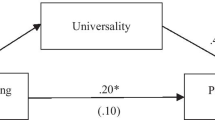Abstract
The present study investigated the effects of didactic and experiential supervision procedures on the judged counseling effectiveness of high and low cognitive complexity counselor trainees. Subjects in the two supervision groups (N=16) were trained in attending, questioning, and reflection of feeling over three sessions. Training consisted of exposure to videotaped counseling models, discussion of the model's behavior with the supervisor, videotaped role playing of therapy, and discussion of the therapy with the supervisor. Training was exactly the same for both groups except for supervision. A control group (N=8) did not receive any training. All subjects, including controls, were pre- and post-tested for counseling effectiveness as measured by judged tape ratings on the 25-item Counselor Effectiveness Scale and four scales designed to assess affective, exploratory, listening, and honest labeling responses.
High complex subjects responsed more favorably to the didactic supervision significantly outperforming both the high complex controls and the low complex didactic subjects on four of the five dependent measures, whereas high and low complex subjects did not respond differentially to the experiential supervision. The results were discussed in terms of fitting the complexity of the students to the supervision approach in selecting students for counseling programs.
Similar content being viewed by others
References
Agler, L.S. (1975). The process of supervision. ED 128738, University of Illinois. October.
Bieri, J., Atkins, A., Briar, S., Leaman, R., Miller, H., and Tripodi, T. (1966). Clinical and social judgment: The discrimination of behavioral information. New York: Wiley.
Birk, J.M. (1972). Effects of counseling supervision method and preference on empathic understanding. Journal of Counseling Psychology, 19(6): 542–546.
Bordin, E.S. (1955). Psychological counseling. New York: Appleton-Century-Crofts.
Brams, J.M. (1961). Counselor characteristics and effective commun cation in counseling. Journal of Counseling Psychology, 8 (1): 25–30.
Carlson, K.W. (1974). Increasing verbal empathy as a function of feedback and instruction. Counselor Education and Supervision, 13 (3): 208–213.
Delaney, D.J., Long, T.J., Masucci, M.J., and Moses, H.A. (1969). Skill acquisition and perception change of counselor candidates during practicum. Counselor Education and Supervision. 8 (4): 273–282.
Gibbs, J. (1968). The counselor as a role-free person. In C.A.Parker (Ed.), Counselor theories and counselor education. Boston: Houghton-Mifflin.
Gruberg, R.R. (1966). The relationship of counselor interview style and rated effectiveness of response to counselor tolerance of ambiguity. Unpublished doctoral dissertation. State University of New York at Albany.
Heist, P., and Yonge, G. (1968). Omnibus Personality Inventory Manua, Form F. New York. Psychological Corporation.
Ivey, A.E., Normington, C.J., Miller, C.D., Morrill, W.H., and Haase, R.F. (1968). Microcounseling and attending behavior: An approach to pre-practicum counselor training. Journal of Counseling Psychology, Monograph Supplement, 15: 1–12.
Kagan, N. (1972). Influencing human interaction. East Lansing, Michigan State University.
Kelly, G.A. (1955). The psychology of personal constructs, Vols. 1 and 2 New York, Norton.
Oksanen, I.A. (1973). The influence of training in the dimensions of empathy, respect, concreteness and genuineness on counselor effectiveness. Dissertation Abstracts International, 34 (6-A): 3067.
Patterson, C.H. (1964). Supervising students in the counseling practicum. Journal of Counseling Psychology, 11 (1): 47–53.
Payne, P.A., and Gralinski, D.M. (1968). Effects of supervisor style and empathy upon counselor learning. Journal of Counseling Psychology, 15: 517–521.
Payne, P.A., Weiss, S.D., and Kapp, R.A. (1972). Didactic, experiential, and modeling factors in the learning of empathy. Journal of Counseling Psychology, 19 (5): 425–429.
Payne, P.A., Winter, D.E., and Bell, G.E. (1972). Effects of supervisor style on the learning of empathy in a supervision analogue. Counselor Education and Supervision, 11 (4): 262–269.
Rogers, C.R. (1957). The necessary and sufficient conditions of the therapeutic personality change. Journal of Consulting Psychology, 21: 95–103.
Silverman, M.S. (1972). Perceptions of counseling following differential practicum experiences. Journal of Counseling Psychology, 19 (1): 11–15.
Silverman, M.S. (1973). Practicum perception of initial interviews: Chent-counselor divergence. Counselor Education and Supervision, 13: 158–161.
Stone, S.C., and Shertzer, B.E. (1963). The militant counselor. Personnel and Gurdance Journal 42 (4): 342–347.
Wolberg, L.R., (1954). The technique of psychotherapy, New York: Greene and Stratton.
Author information
Authors and Affiliations
Rights and permissions
About this article
Cite this article
Malikiosi-Loizos, M., Mehnert, W.O., Work, G.G. et al. Differential supervision and cognitive structure effects on empathy and counseling effectiveness. Int J Adv Counselling 4, 119–129 (1981). https://doi.org/10.1007/BF00139735
Issue Date:
DOI: https://doi.org/10.1007/BF00139735




